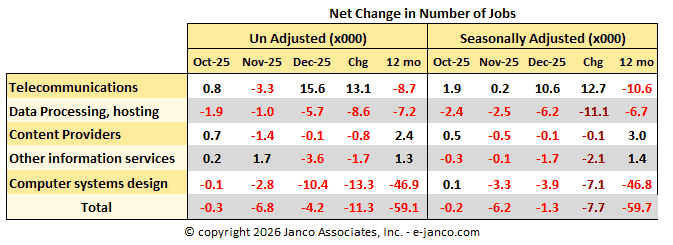CIOs Opting for IT Contractors Over Hiring Full-Time Staff
By Sharon Florentine
CIOs Opting for IT Contractors Over Hiring Full-Time Staff - The latest Bureau of Labor Statistics data reveals that over the last 12 months, only 77,600 IT jobs were added, as CIOs and hiring managers remain cautious about the slow economic recovery, says Victor Janulaitis, CEO of Janco Associates, a management consulting firm that specializes in IT.
According to the BLS data, September's IT jobs number was adjusted down from a gain of 2,500 jobs to a loss of 3,600 jobs. At the same time, the number of jobs reported as gained in October was only 5,200. But amid these dismal numbers, Janulaitis says, there's a bright spot companies are increasing their budgets for hiring skilled IT contractors.
In the last three (3) months the IT Job market shrank by 7,700 jobs. This chart is not the originally published one, rather it is updated with the current data based on the analysis by Janco Associates, Inc. For the latest IT Employment Data click here. Subscribe to our Newsletter to get this information delivered to your inbox as soon as it is released. SUBSCRIBE
CIOs Reluctant to Hire, Eager to Contract
"They all need larger budgets and staff to deal with this but are reluctant to hire new, full-time employees," Janulaitis says.
That's where IT contractors come in, according to IT recruiting, staffing and consulting firm Mondo. A recent survey of more than 200 IT decision makers in combination with data from Mondo's network of contract IT placements reveals that 48 percent of respondents plan to hire more IT contractors than full-time staff in the next year to 18 months, and 32 percent expect to increase their annual budget for hiring IT contract workers, says Mondo's vice president of marketing.
Budgets for contract spending are increasing, especially in the media, communications, publishing and higher-ed markets.
What we see from our clients is they are using those budgets to invest in IT contractors skilled at maximizing and squeezing additional value out of their existing technology platforms. They need Web developrs, application developrs, and mobile development professionals, and also a lot of that spend is being pushed toward marketing.
According to the Mondo survey, 73 percent of survey respondents currently use contractors for application development, Web and mobile development, application hosting and application maintenance.
Thirty percent of respondents indicated they plan to outsource more application development work and 27 percent plan to outsource more mobile and web development in the next 12-18 months, according to the survey.
Peter Cannone, CEO of IT contract staffing and workforce-as-a-service provider OnForce says the findings are consistent with what his company's clients are experiencing.
Demand for IT Contractors Is No Fluke
Demand has definitely increased for IT contractors. CIOs are facing an aging workforce, and they want to leverage existing technology to the fullest without increasing budgets for full-time hires.
CIOs want to build a flexible workforce, streamline and drive cost efficiencies, and they are asking us for help to save anywhere from 30 percent to 60 percent off the bottom line. That demand has increased monthly applications to OnForce's Workforce-as-a-Service solution increase from about 750 applicants per month to around 1,000 applicants per month.
He adds that this trend toward contractors instead of full-time hires isn't just a fluke, especially as enterprises cut back on benefits and perks for full-time employees and move toward a contractor-heavy workforce.
Don't Expect to Save Money
While companies can save money by increasing their contract workforce, there's a caveat. Many IT contractors have left the full-time workforce by choice, or are working as contractors because they're unable to find full-time employment. But that doesn't mean they're less skilled or less desirable; in fact, they could have deep and broad skillsets.
It's a common misconception; in some cases, it's not any cheaper to outsource. And while companies certainly can save by hiring on a contract basis, there's still expenditure. What we're seeing, is the demand from clients for a much more mature, deep skillset and greater experience across multiple platforms.
These types of employees are much harder to find, and much more expensive, and that fact could correlates with a budget increase in contract spending.
In some cases, she says, clients experience sticker shock when they realize that the skills, experience, and maturity they want in an employee is going to cost more than they thought, but at the end of the day, to remain competitive in a tough market, they must pony up.
In order to get the talent they want at the skill and expertise level they want, they have to pay for that, whether it's a contract employee or a full-time hire. Sometimes, their lowering budgets can be a negotiating tactic, but, in many cases, it's just a matter of educating the client about the real-world value of these employees.
They believe they're saving so much on the bottom line by using contract workers. but they just don't understand how expensive it will be.
Order Salary Survey Download Sample Provide Data











